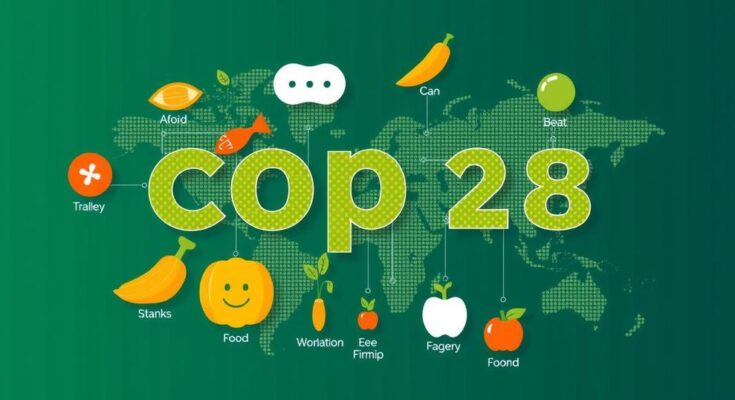World leaders meet at COP29 in Baku, Azerbaijan, following COP28, where 160 nations pledged to integrate food systems into climate action plans. Despite this progress, only about 40 countries are actively updating their plans, raising concerns about the viability of commitments, notably regarding dietary changes. Financial investments were substantial, but delays in key initiatives, such as the FAO’s roadmap, have resulted in criticism and calls for more decisive actions to address global emissions linked to food.
This week, global leaders convene in Baku, Azerbaijan for the 29th annual United Nations Climate Change Conference, or COP29. Following the significant advancements made at last year’s COP28, which was the first to address food-related greenhouse gas emissions, over 100 nations pledged to reform their food systems by 2025. However, despite this linkage being identified as crucial—given that food systems contribute a third of global emissions, primarily from meat consumption—progress has been inadequate, with only about 40 nations actively pursuing updates to their climate plans ahead of COP30. During COP28, 160 nations endorsed the UAE Declaration on Sustainable Agriculture, which included obligations to incorporate food systems in national climate action plans. While the participation of these countries is significant, accounting for a substantial proportion of agricultural emissions, the realization of pledged commitments remains elusive. Edward Davey from the World Resources Institute expressed pride in the COP28 achievements but cautioned that more action is necessary to honor the declaration. The UK represents one of the nations intending to present a revised national climate plan focused on dietary adjustments, a move deemed essential for achieving net-zero targets. Similar warnings have arisen regarding other Global North countries, where high meat consumption is integral to agricultural emissions. Davey highlighted that sustainable agricultural practices must accompany calls for reduced meat consumption, although shifting diets poses considerable political challenges. At COP28, substantial financial commitments were made to food system pledges by entities including the UAE and the Bill and Melinda Gates Foundation, which collectively earmarked over $7 billion. Additionally, the UN’s Food and Agriculture Organization (FAO) put forth a roadmap aimed at balancing food security with emission reductions, yet progress has been hampered by delays and stakeholder criticisms regarding its efficacy. Challenges include addressing productivity in the Global South while safeguarding environmental integrity. Some initiatives, however, have demonstrated potential for success, notably the Alliance of Champions for Food Systems Transformation, established last year to facilitate significant transformations within its member countries. By collaborating on shared goals and practical solutions, these nations have made strides toward enhancing their food systems without detriment to natural ecosystems.
The focus of the upcoming COP29 is to evaluate the progress made since COP28, particularly regarding food system commitments and overall emissions reduction strategies. As evidenced by the participation of 160 countries in the UAE Declaration on Sustainable Agriculture, addressing agricultural emissions has become increasingly recognized as pivotal in the fight against climate change. COP28 emerged as a landmark moment in which food systems, often overlooked in climate deliberations, gained prominence on the international agenda. However, achieving the ambitious targets of these pledges remains a challenge, as many countries struggle to integrate sustainable practices into national frameworks. The landscape is further complicated by the need for dietary shifts and the economic implications associated with large-scale changes to food systems.
In conclusion, COP29 presents both an opportunity and a challenge for global leaders to address food system reforms crucial to mitigating climate change. Although significant declarations were made at COP28, their successful implementation remains uncertain as a majority of countries have yet to modify their national climate action plans accordingly. With the added complexities of necessary dietary shifts and entrenched agricultural practices, the efficacy of the upcoming conference in propelling nations toward concrete action remains to be seen.
Original Source: sentientmedia.org




